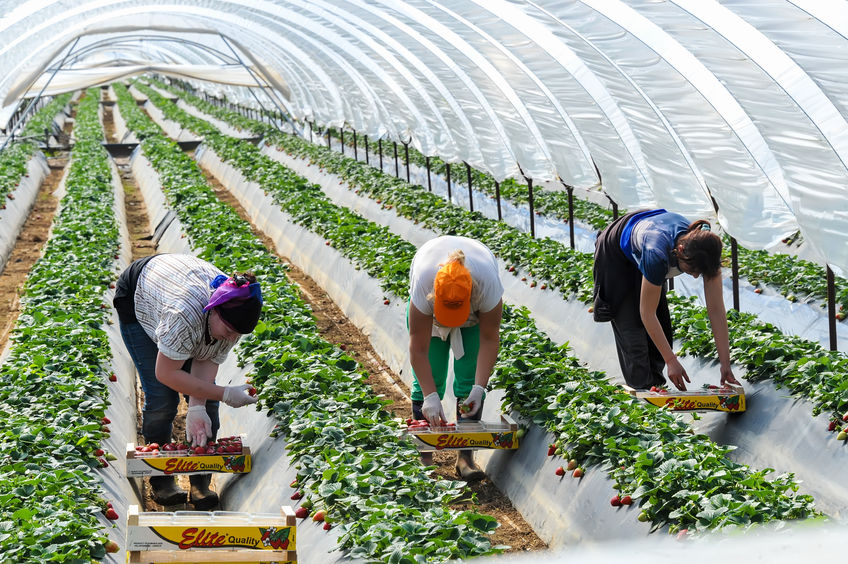
The National Farmers' Union has warned the government that a 'no-deal' Brexit scenario will cause 'considerable disruption' for the farming industry.
The comments come after news that the Transport Minister Chris Grayling said British farmers will produce more food when the UK leaves the European Union without a trade deal.
Mr Grayling said that in the event of a no-deal Brexit, the UK would respond by growing more produce and importing from more places around the world, in order to prevent a rise of food prices.
His comments, coupled with a new report which predicts food price rises in the event of the UK walking away with no-deal, have caused the farming industry to respond with alarm.
NFU's Director of EU Exit and International Trade Nick von Westenholz said there will be 'considerable disruption' if a trade deal is not secured with the EU.
However, he said that farmers know that there will be opportunities arising from leaving the EU, including increasing the amount of home-grown food consumed by the British public.
'Extent of trade'
“Given the extent of our trade in food with the EU, failure to secure a comprehensive trade deal would cause considerable disruption to farming in the UK,” Mr Westenholz said.
“Although there is some scope for import substitution, farming operates on long timescales. For example, the first crop to be produced post-Brexit will be in the ground in less than a year.
“Furthermore, due to the amount of food we import that isn’t grown here, as well as issues such as managing carcass balance, simply upping production to quickly offset any reduction in food imports isn’t feasible.”
Mr Westenholz said Brexit will offer new opportunities for British farmers, but reiterates the UK must maintain clear free trade with the EU, where most of the UK's food exports head.
'Incontrovertible'
The evidence supporting the need for the UK to remain in the single market and customs union after Brexit is now "incontrovertible", the Farmers’ Union of Wales FUW) has explained.
The union has called for "common sense to prevail".
“Continuing membership of these two institutions is the only way to avoid the dire collapse in incomes predicted in the latest AHDB report and in the FAPRI report in August,” said FUW President Glyn Roberts.
The latest AHDB ‘Horizon’ publication released last week reported the results of detailed modelling of different Brexit scenarios.
The document highlights the risks faced if Britain leaves the EU without easy, tariff-free access to the single market, with Less Favoured Area livestock farm incomes particularly hard hit, falling to negative figures in the worst case scenario.
Lowland livestock farms fare little better, with incomes falling to less than £4,000 in two of the three scenarios looked at, and across all UK farm types, incomes more than halve under an ‘extreme’ Brexit scenario.
“Talks with the EU about some kind of alternative arrangement have not even begun, yet we only have around seventeen months before we leave the EU,” Mr Roberts explained.
'Complex process'
Mr Roberts said that even where agreement had been reached with the EU, other World Trade Organisation members had objected, highlighting the dangers the UK would face in leaving the world’s biggest free market and attempting to negotiate with WTO members.
“The EU and UK sent a letter last week to WTO members outlining an agreed position on how quotas should be split when the UK leaves the EU, but the USA and other WTO members, including Canada, Argentina, Brazil and New Zealand, had already written to the EU and UK WTO ambassadors stating their objections to the proposals,” added Glyn Roberts.
The letter, signed by seven of the WTO’s 164 members, states: "Such an outcome would not be consistent with the principle of leaving other [WTO] members no worse off, nor fully honour the existing TRQ access commitments. Thus, we cannot accept such an agreement."
Mr Roberts continued: “This underlines the fact that the current EU negotiations are just the start of a complex process that would normally take decades.
“Almost daily we are seeing developments that reinforce the message that the only sensible outcome is to ensure we are still members of the common market and customs union on the day we leave the EU. Once that is accepted, the majority of the dangers, challenges and uncertainty just disappear,” said Glyn Roberts.
